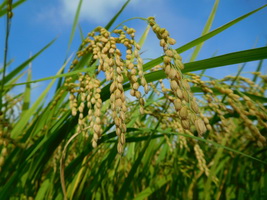
Web Portal Established to Speed up Genetic Research in Plants
July 26, 2017| |
 Scientists from University of California, Davis and partners successfully completed the first whole-genome sequence of fast-neutron-induced mutations of a model variety of rice known as Kitaake which has a short life cycle of just nine weeks. This collection will help speed up genetic research in rice and other monocots that can be used as biofuels. A web portal called KitBase was launched to allow other researchers to get information related to the mutant collection, such as sequence, mutation, and phenotypic data for each rice line.
Scientists from University of California, Davis and partners successfully completed the first whole-genome sequence of fast-neutron-induced mutations of a model variety of rice known as Kitaake which has a short life cycle of just nine weeks. This collection will help speed up genetic research in rice and other monocots that can be used as biofuels. A web portal called KitBase was launched to allow other researchers to get information related to the mutant collection, such as sequence, mutation, and phenotypic data for each rice line.
According to Guotian Li from Lawrence Berkeley National Laboratory, the fast-neutron irradiation causes various forms of mutations that lead to different alleles of genes, which is not achieavable from other techniques. The team used just 50 plants to get the mutant collection using the technique. If they used the conventional approach, they would have needed over 16,000 plants. They were able to identify a total of 91,513 mutations which affected 32,307 genes or 58% of all genes in the rice genome. The paper is published in The Plant Cell.
"This comparison clearly demonstrates the power of the sequenced mutant population for rapid genetic analysis," said Pamela Ronald from UC Davis, who is the principal author of the paper.
Access the web portal KitBase for more information.
| |
Biotech Updates is a weekly newsletter of ISAAA, a not-for-profit organization. It is distributed for free to over 22,000 subscribers worldwide to inform them about the key developments in biosciences, especially in biotechnology. Your support will help us in our mission to feed the world with knowledge. You can help by donating as little as $10.
-
See more articles:
-
News from Around the World
- Web Portal Established to Speed up Genetic Research in Plants
- India's B.R. Barwale Passes Away
- African Biosafety Regulators Embrace Biosafety Communication at ABBC 2017
- Biotechnology Praised at the Biggest Agri Expo in Uganda
- Adoption of GE Crops in the US
- New Gene in Corn Confers Resistance to Multiple Diseases
- Study Finds Plants Reprogram Their Genetic Material to Fight Pathogens
- China Gives Import Approval for Corn Rootworm Resistant Trait
- Russia Drafts Regulations for GE Feed
-
Research Highlights
- Overexpression of BoC3H Gene Enhances Salt Stress Tolerance in Broccoli
- Study on the Effect of Light and Temperature on CBF14 Expression in Wheat and Barley
-
Beyond Crop Biotech
- NAS Announces Awards for Science Communication
- Researchers Develop Plant-produced Vaccine Candidates Against Bluetongue Virus
-
Plant
- CRISPR-Cas9 and CRISPR-Cpf1 Mediated Genome Editing of EPFL9 Gene in Rice
- Discovery on How CRISPR Proteins Identify Targets
-
Read the latest: - Biotech Updates (August 27, 2025)
- Gene Editing Supplement (August 27, 2025)
- Gene Drive Supplement (February 22, 2023)
-
Subscribe to BU: - Share
- Tweet
